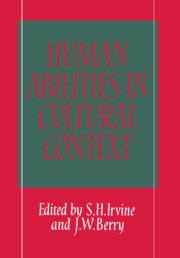Book contents
- Frontmatter
- Contents
- List of contributors
- Preface
- Acknowledgments
- Part I Human abilities in theoretical cultures
- Part II Cultural responses to ability measurement
- 7 The British “cultural influence” on ability testing
- 8 Cultural influences on patterns of abilities in North America
- 9 Human abilities in the Eastern Mediterranean
- 10 The Norwegian experience of test use: A selective review of Norwegian tests and measurements in cultural context
- 11 Human assessment in Australia
- 12 Test performance of blacks in Southern Africa
- 13 Individual differences among the peoples of China
- 14 Japanese abilities and achievements
- Part III Cultural limits upon human assessment
- Author index
- Subject index
7 - The British “cultural influence” on ability testing
from Part II - Cultural responses to ability measurement
Published online by Cambridge University Press: 13 January 2010
- Frontmatter
- Contents
- List of contributors
- Preface
- Acknowledgments
- Part I Human abilities in theoretical cultures
- Part II Cultural responses to ability measurement
- 7 The British “cultural influence” on ability testing
- 8 Cultural influences on patterns of abilities in North America
- 9 Human abilities in the Eastern Mediterranean
- 10 The Norwegian experience of test use: A selective review of Norwegian tests and measurements in cultural context
- 11 Human assessment in Australia
- 12 Test performance of blacks in Southern Africa
- 13 Individual differences among the peoples of China
- 14 Japanese abilities and achievements
- Part III Cultural limits upon human assessment
- Author index
- Subject index
Summary
Jensen dedicated Bias in Mental Testing (Jensen 1980) to three pioneers of psychometry: Francis Galton, Alfred Binet, and Charles Spearman. The methods and constructs of these men, he writes, have dominated the field from its beginnings to the present day. Furthermore, although there is considerable agreement among psychometricians about the importance of this trinity there is no universal consensus about any others.
I therefore begin this chapter, which is concerned with the British influence on ability testing, with an examination of the work of Galton and Spearman. My treatment of these innovators consists of selecting out the essentials of their work and demonstrating how, even today, albeit in sometimes mutated form, its seminal nature can be discerned. Indeed, this is the approach I adopt with all the major figures in British psychometrics who have influenced the field. In a concluding section I attempt to summarise the British contribution. Thus, a scientific “cultural influence” on the quest for a structure of intellect is defined; and it represents the British response to problems of ability testing that were encountered from the very beginning and need resolution even today. From a scrutiny of the work of the early pioneers of psychometrics, their choice of subject matter and their general methodological approach – rather than the precise details of their results and statistical techniques – emerge as heritable characteristics. For, as is to be expected in approximately 100 years of endeavour that has witnessed an enormous increase in scientific knowledge of all kinds, their work has been entirely superseded.
- Type
- Chapter
- Information
- Human Abilities in Cultural Context , pp. 186 - 207Publisher: Cambridge University PressPrint publication year: 1988



